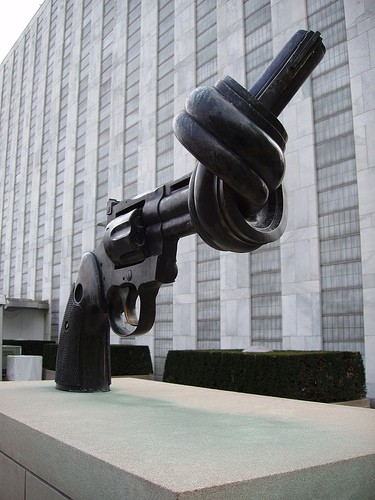I can’t imagine that there is anyone who has not been a part of some kind of discussion or even argument about gun violence over the past two months. And even though it can be extremely challenging, I hope everyone has had the opportunity of doing so with someone they disagree with. One possible discussion, though real-life encounters are seldom this sane or dispassionate, might have gone something like this:
Smith: “There is no reason why anyone needs a gun that can fire 30 rounds at a time. We should ban high capacity magazines.”
Wesson: “Crimes are committed by people who don’t follow laws anyway. Banning magazines or assault rifles won’t keep people who want to use them to hurt people from using them. Lawful citizens have a Constitutional right to bear arms.”
Smith: “So if you don’t think any gun regulations are acceptable, what’s your solution to all the gun violence?”
Wesson: “It’s the people who use the guns, not the guns themselves that are the problem. We need to keep guns out of the hands of mentally ill but shouldn’t curtail the rights of upstanding citizens.”
Smith: “The right to bear arms was established when people used muskets. We are in a totally different situation now and kids will keep getting killed until the gun lobby admits guns are part of the problem.”
Wesson: “Guns aren’t the problem. Guns are the solution. We need armed guards at our schools like we have at federal offices. Aren’t our children as important as government employees?”
The debate could go on and on. And it will. One of my biggest concerns is that we continue to rhetorically circle each other without agreeing on what is really at stake. Is the concern the rights and responsibilities of gun owners? Is it about the mentally ill? Is it about safe schools? Is it about the role of government? Of course it’s all of this and more. There has to be a way to reframe the public policy conversation that is now occurring, because much like the contraception debate one year ago, we have many streams that are too easily crossed.
* * *
So what is really at stake in this debate? It won’t surprise our regular readers that I think we are basically embroiled in a public health issue. The whole reason we are talking about guns isn’t about guns per se, but rather the loss of healthy life when guns lead to death or disability. The real issue is about life lost prematurely. And that’s what public health is good at addressing.
Those of us in the field of public health attempt to figure out why life is being lost prematurely and then try to design interventions to prevent it. So, whether you know it or not, when you are talking about gun control, you are primarily engaging in a public health debate. Welcome!
The central question of the present debate is: how much can liberty be infringed upon to achieve a public health goal? If you aren’t all that familiar with public health debates, you should know that this specific question is a very common one.
It’s the same question we ask when deciding how to decrease road traffic injuries or how to stop the spread of measles or how to curb the rise in obesity. Sometimes we restrict choice such as mandating the use of seat belts. Sometimes we incentivize choice by making healthy snacks cheaper in the cafeteria. Sometimes we enable choice by running education campaigns. There isn’t a one-size-fits-all way of solving the liberty question, especially in a country like the United States. But public health is at its best (and most ethical) when it asks, “What are the least restrictive interventions that actually accomplish a particular public health goal?”
Some might claim that gun ownership is unique because we have a right to bear arms. I am not a Constitutional lawyer, but even the Bill of Rights doesn’t come without some restrictions. Incitement of imminent violence and obscenity are not protected by the First Amendment right to free speech. Free assembly can be restricted by time and location if it is a safety hazard or disturbs the peace.
So the question is not whether the right to bear arms should be limited but what limits are appropriate for the common good. Maybe we already have too many. Maybe we don’t have enough. Or maybe we have the Goldilocks-situation of gun restrictions and have it just right. The point is we must start from the premise that the right to bear arms can be limited but it must be limited for good reason.
* * *
Public health ethics treads a well-worn path in asking whether a particular limit on liberty is appropriate for the desired public health good.1 Here’s the rub with the debate on gun violence: will a ban on assault rifles actually make a difference? Which mental health conditions should lead to restrictions on gun ownership? Will universal background checks reduce the violence? The truth is nobody knows. Why? Because the gun lobby has successfully prevented public health researchers from studying gun violence.
I don’t claim to know what should actually be done. But I want to say very clearly that it is shameful that one side of the debate has actually prevented gaining the knowledge necessary to make good decisions. We can’t say whether gun control works because we aren’t able to research if it does. If you want evidence, take a look at page 10 of this fine report. Really do take a look at all of it and ask yourself if this might be a good place to start our conversation about gun violence.
Imagine if car manufacturers had successfully prevented research on the safety of motor vehicles. They could say, “It’s not cars who kill people, it’s the people who drive cars.” So why should people’s right to drive whatever car they want be infringed upon? It’s because we have a responsibility to put common sense restrictions on individual liberty in order to maintain the common good. And that means we restrict the size of cars, we require seat belts and airbags, we create and enforce rules of the road, and so on.
Some suggest that we should enforce the gun laws we have rather than creating new ones. Fair enough. But we don’t know whether or how existing laws work either. I disapprove of a biased research agenda aimed at justifying gun restrictions as much as I disapprove of this biased hostility toward research.
* * *
Some may dismiss my talk of restrictions as the grumblings of an overeducated, liberal elitist who doesn’t have experience with firearms. But I am from rural Missouri. I had target practice when I spent the night at my friends’ houses (I was never a good shot) and ate the spoils of the hunting expeditions of my family and friends. As high school seniors we had two excused absences – some used them for the first two days of deer season, others used them to tour colleges, and a great many did both.
It is a little too easy for people to dismiss their opponents as ‘crazy gun-lovers’ on one side or ‘fascist government thieves’ on the other. This kind of name-calling is really just a way to avoid the tough work of public debate. When you hear someone do that you can almost be sure that the person making the ad hominem attack is afraid to have a real discussion. Here is where I wish religious leaders would play a more active role.
Imagine if our moral leaders were able to lead us in reflecting about who we hope to be, both as individuals and as a society. I don’t want religious leaders to be public policy experts, but I do want them to be experts in helping communities think about the values or virtues that animate who we are and what we do. If we stopped worrying about the splinter in our neighbor’s eye, what logs might we find in our own?
Maybe we would we have just as much passion for providing care for the mentally ill as we suddenly have for keeping guns out of their hands.
Maybe the rural hunting culture would be respected for what it actually is and neither dismissed by the left nor used as a cloak by the right.
Maybe we could believe the words of Jesus after the resurrection – “Do not be afraid” – as much as we believe the words of the 2nd Amendment.
* * *
It seems like many of my articles depend on me being politically naive and unjustifiably hopeful about the state of public discourse. I am all for pragmatism, but we have to hold what is possible in tension with our highest aspirations and dreams which might seem out of reach. If we don’t think about who we want to be as much as we think about what we can do, we risk becoming a nation of the lowest common denominator.
Some say that the devil is in the details, but I for one, am not willing to cede that kind of ground to the devil. I think God is in the details as much as God is in the big picture. Specific ideas are signs of much deeper (and often unarticulated) values, and religious leaders can fill a desperate void by helping us name them. In doing so, they can worry less about endorsing specific positions and hope more that those to whom they preach become leaven in the world – leaven that will help us rise to address this, and other important matters of public health and to meet the challenge of liberty.
— — — — —
- The Nuffield Council developed what is called the Intervention Ladder, a good resource to help evaluate the ethical challenges of different kinds of public health interventions. ↩





